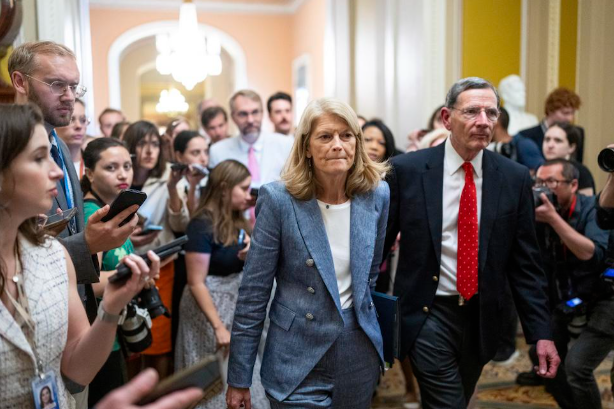Alaska Gets Special Treatment in Senate’s Latest Tax & Spending Bill Revisions!

In a dramatic turn of events, the U.S. Senate has made sweeping last-minute changes to President Trump’s controversial tax and spending proposal—informally known as the “One Big Beautiful Bill”—in an attempt to secure a critical vote from Senator Lisa Murkowski of Alaska.

As lawmakers race to pass the legislation before the July 4 deadline, new provisions tailored specifically to benefit Alaska have raised eyebrows nationwide.
Why Alaska? One Vote Could Make or Break the Bill
With the Senate deeply divided, Murkowski’s support is seen as pivotal. Her concerns about the bill’s steep cuts to Medicaid and food assistance programs (SNAP) led to significant revisions aimed at softening the blow—particularly for her home state.
According to an op-ed by Alaska House Speaker Bryce Edgmon and Senate Majority Leader Cathy Giessel, the original bill would have stripped 40,000 Alaskans of health coverage and slashed benefits for thousands more.
Senate’s Sweeteners for Alaska: A Closer Look
To gain Murkowski’s approval, the revised bill now includes several Alaska-focused incentives:
- Boosted Medicaid Match Rate: Alaska will receive a 25% higher federal Medicaid reimbursement rate due to its classification as the state with the highest poverty guideline.
- SNAP Work Requirement Exemptions: Alaska (and Hawaii) are now exempt from the bill’s national work requirements for food assistance programs.
- Increased Medicare Rates: Healthcare providers in Alaska will receive higher Medicare reimbursements, supporting hospitals in remote or underserved areas.
- SNAP Cost-Sharing Waiver: Alaska will avoid paying into SNAP as long as the state is “actively correcting” errors, even though it has the highest SNAP error rate in the nation.
- Rural Hospital Fund Boost: Funding for rural hospitals increased from $15 billion to $25 billion—though critics argue this is insufficient compared to the bill’s proposed $930 billion in Medicaid cuts.
Critics Call It a Strategic Buyout
Policy analysts say the changes are more symbolic than structural. The core elements of the bill—tax cuts skewed toward high-income earners, drastic reductions in social spending, and increased borrowing—remain largely intact.
However, the Alaska-specific perks are raising concerns about fairness and political bargaining, especially as other states face the full brunt of the bill’s austerity.
Fiscal Outlook Still Dire
Despite adjustments, the nonpartisan Congressional Budget Office (CBO) estimates the bill would add over $3 trillion to the federal deficit through 2034. While the added benefits may ease the impact on Alaska, the broader economic implications remain unchanged.
Final Thoughts
The revised bill highlights how pivotal votes can sway massive policy decisions—and how targeted state-level provisions can turn national legislation into regional negotiations.
Whether the House will accept the Senate’s Alaska-friendly version remains to be seen, especially with budget hawks and moderates voicing fresh concerns.


